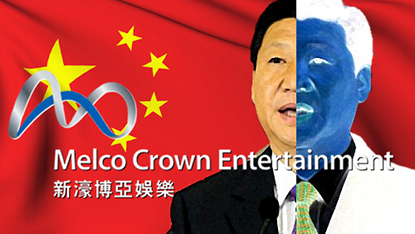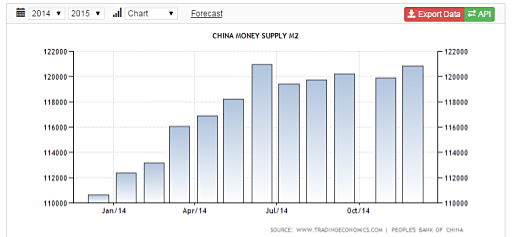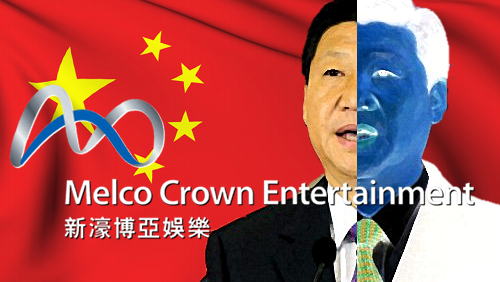 Melco Crown Entertainment‘s (MPEL) recent delisting from the Hong Kong stock exchange has many worrying about the year ahead for the company. But anyone who’s been reading CalvinAyre.com should have been worried about Macau-focused companies a long time ago.
Melco Crown Entertainment‘s (MPEL) recent delisting from the Hong Kong stock exchange has many worrying about the year ahead for the company. But anyone who’s been reading CalvinAyre.com should have been worried about Macau-focused companies a long time ago.
This specific delisting move should not give anyone the jitters, as it is simply procedural. Melco has always had shrewd management that isn’t afraid to make the right moves even if those moves cause investors to get a little nervous. The move was simple: Listing on the HK exchange did not have enough benefits to make it worthwhile to deal with the regulatory burden. Melco is citing high regulatory costs and the like, but aside from the $9M cost of listing there originally incurred in 2011, there have been no associated listing expenses, at least not direct ones, since then.
The expenses of listing on the HK exchange are rather administrative, along with plain old opportunity costs. Instead of hiring a staff to deal with fulltime paper-pushing and dealing with Hong Kong bureaucrats just in order to maintain a thinly-traded security that is already listed on the NASDAQ, Melco can now take those resources and invest them elsewhere. Rather than try to keep up appearances, Melco made the right decision here.
Unfortunately, the company is still in the middle of a financial hurricane doing its best to batten down the hatches and stay responsible. Mass gaming revenue for Macau, Melco’s specialty, is down over 30% in December alone, putting the final 2014 mass market numbers down an overall 2.6% year over year. The big question will be Melco’s mass market numbers in relation to that decline. They should be above the Macau average, but this probably will not reverse the down trend in MPEL given the current macro conditions. It will indicate, however, that Melco can perform under stress, which is what it is demonstrably good at doing.
Think of it like a spring, hackneyed as that analogy is I will use it slightly differently here. All the springs right now are being weighed down by monetary conditions in China. The weakest casinos are the easiest springs to push down. When the weight is lifted, they spring back up, but very weakly. The strongest casinos will be the hardest to push down, and they are the ones that will show relatively good numbers compared with the average, and I have a hunch Melco will be one of the strongest performers during this rough period relatively speaking, simply judging by management style and decision-making. The stronger the spring, the harder it will push back up when the pressure is released.
A little more on those monetary conditions though. China is getting a bit schizophrenic now as the situation there continues to decay. On the one hand, the government is doing something very right, which is quite surprising, in that it has gotten rid of price controls over 24 commodities and services, including all agricultural products. This is a very good move that will keep the country clear of any shortages or surpluses that will develop as a result of price controls veering too far away from the free market price for any given good or service. On the other hand, China just announced a $1T program for infrastructure projects in oil, gas, mining, transportation, and clean energy. This is a very big no-no for the same reason that price controls are a big no-no.
There is of course the 2006-2007 example of the housing crash due to government investment in real estate in the US, but let’s take a newer one, one going on right now, of government investment via subsidies in the US shale oil industry, which is now buckling due to a collapsing oil price and about to bring with it a tsunami of defaults. Government investment of anything is simply taking voluntary investment in one thing and forcing it into investment in another thing. This does not accomplish anything on net, and only creates imbalances in an economy that eventually have to be corrected through recession and debt liquidation, AKA default.
Now, the combination of getting rid of price controls and pumping a few sectors with $1T can be extremely inflationary, on the condition that the money is coming from the central bank itself, in this case the People’s Bank of China. However, it seems that the PBOC is not involved in this latest episode of “stimulus,” or if it is, it is only involved in a very limited way. According to Reuters (emphasis mine):
- The projects will be funded by the central and local governments, state-owned firms, loans and the private sector, said the people. The investment will be in seven industries including oil and gas pipelines, health, clean energy, transportation and mining, according to the people. They said the NDRC is also studying projects in other industries in case the government needs to provide more support for growth…
China has sought ways to stimulate growth without resorting to full-blown stimulus as it seeks to keep a lid on total debt that is now more than 200% of gross domestic product. The central bank added liquidity into the banking system last year and announced an interest-rate cut on Nov. 21.
Where the loans are coming from is the big question. If they are coming from the PBOC, it is new money that will be inflationary. If it is coming from the public in a simple bond issue, then it will not be inflationary, and only lead to misallocation of resources.
The only way to know for sure is to keep your eye on China’s yuan supply over the course of 2015. So far, as of the end of December, it’s not going anywhere. Notice how it leveled off in July at about the same time that Macau’s number began to tailspin.

This new government investment then is going to come at the expense of other industries which will suffer due to liquidity being forced in one direction over another.
As for Melco, now is still not the time to take any position. Morgan Stanley (MS) came out with a forecast of a Macau turnaround as early as this month, but that won’t happen, not in the current environment. Always beware of free advice given out by an investment bank that makes money by trading against retail investors. It’s more dangerous than Greeks bearing gifts. Or to put it in today’s terms, Greeks bearing bonds.
